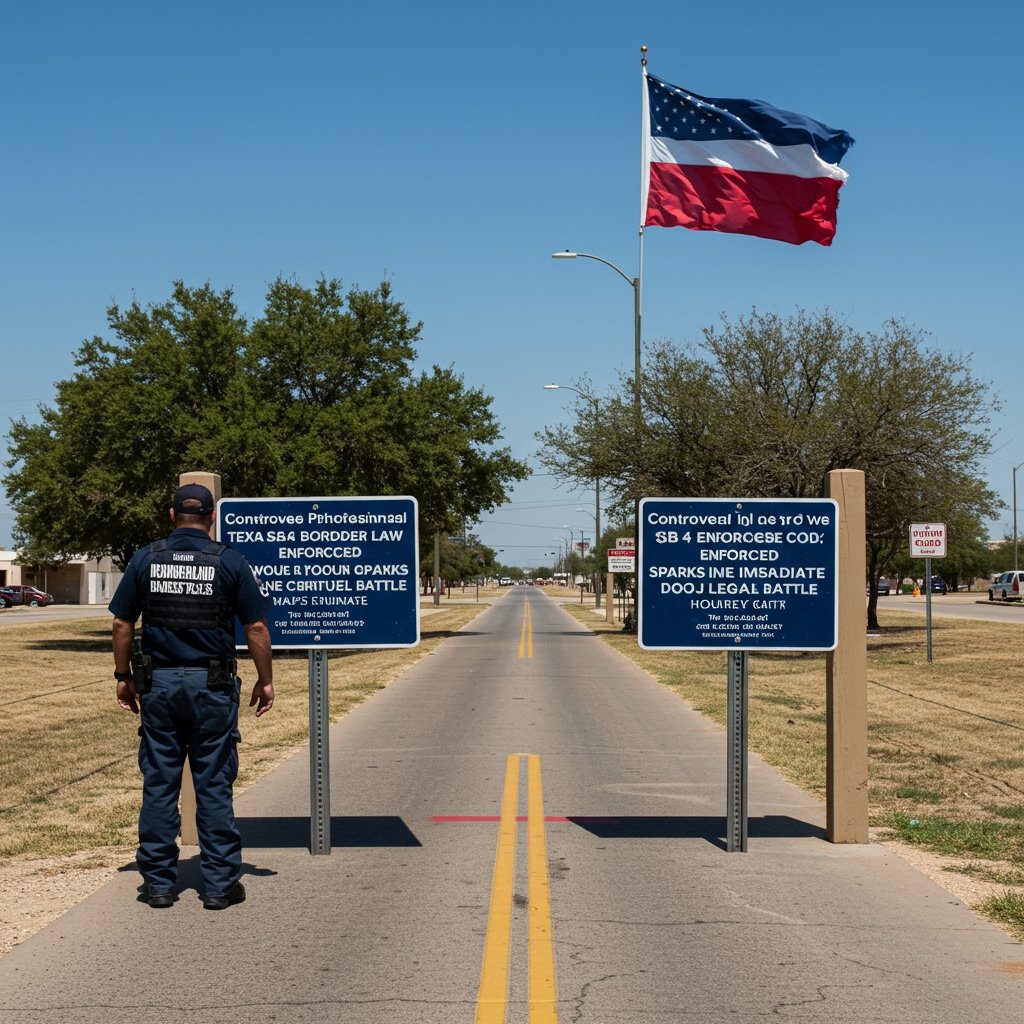Texas Begins Enforcement of SB 4 Amidst Federal Legal Storm
Austin, Texas – On April 15, 2025, the State of Texas commenced enforcement of its controversial Senate Bill 4 (SB 4), a law granting state law enforcement broad authority to arrest, detain, and order the removal of individuals suspected of illegally crossing the international border. The implementation of the statute marked a significant escalation in Texas’s efforts to manage border security, a domain traditionally overseen by the federal government.
The start of enforcement was met almost immediately with a robust legal challenge from the U.S. Department of Justice (DOJ). Within hours of SB 4 taking effect, the DOJ filed a lawsuit arguing that the state law is unconstitutional. The federal government’s complaint centers on the assertion that SB 4 unlawfully intrudes upon the federal government’s exclusive authority over immigration matters and violates the Supremacy Clause of the U.S. Constitution, which establishes that federal laws are the supreme law of the land.
Details of Senate Bill 4
Senate Bill 4, signed into law in December 2023, creates a new state crime in Texas for improper entry into the state from a foreign nation. It empowers any state or local law enforcement officer to arrest individuals they have probable cause to believe illegally crossed the border. Once arrested, migrants could face state criminal charges ranging from a misdemeanor to a felony, depending on prior immigration violations. A key component of the law allows state judges to issue orders for migrants to return to their country of origin, enforceable by state law enforcement. Refusal to comply with a state-issued removal order could lead to further criminal charges.
The statute has been the subject of intense legal and political debate since its passage. Proponents in Texas argue it is a necessary measure to address what they describe as a crisis at the southern border, citing insufficient action and resources from the federal government.
State’s Justification and Stance
Governor Greg Abbott’s office has been a vocal proponent of SB 4, repeatedly defending the law as essential for Texas to protect its border and citizens. Following the commencement of enforcement and the subsequent DOJ lawsuit, the Governor’s office reiterated the state’s position. They maintain that Texas is forced to act due to perceived failures of the federal government to secure the border, pointing to recent reports of high migrant encounter numbers across the southern border as evidence of the ongoing situation requiring state intervention. The state argues that SB 4 is a lawful exercise of its sovereign right to defend itself and manage its territory in the face of what it characterizes as an invasion.
“Texas has the right to defend itself from invasion, and this law is part of our efforts to secure the border,” a spokesperson for the Governor’s office stated, emphasizing the state’s resolve to implement and defend the law in court.
Federal Legal Challenge Takes Shape
The lawsuit filed by the U.S. Department of Justice marks a direct confrontation between the state and federal governments over immigration authority. The DOJ’s filing on April 15, 2025, specifically asks federal courts to block the enforcement of SB 4. The core legal argument rests on the principle that the regulation of immigration is squarely within the exclusive purview of the federal government, citing decades of Supreme Court precedent. The DOJ contends that SB 4 creates a parallel state immigration system that conflicts directly with comprehensive federal immigration laws and policies, thereby violating the Supremacy Clause.
Federal officials argue that allowing individual states to create their own immigration enforcement and removal systems would lead to a patchwork of conflicting laws across the country, undermining national immigration policy and international relations. The lawsuit seeks an injunction to prevent Texas authorities from making arrests or issuing removal orders under SB 4 while the legal challenge proceeds.
Opposition and Civil Rights Concerns
Beyond the federal government, civil rights organizations and immigrant advocacy groups have been fierce opponents of SB 4. These groups have also filed separate legal challenges against the statute, arguing it is not only unconstitutional but also poses significant risks to civil liberties. A primary concern raised by these organizations is the potential for racial profiling, arguing that the law’s broad enforcement powers could lead to discriminatory targeting of individuals based on their appearance or ethnicity, regardless of their immigration status.
Critics also warn that the law could strain relations between law enforcement and immigrant communities, potentially making residents less likely to report crimes or cooperate with authorities. Legal challenges brought by these groups highlight concerns about due process rights for individuals arrested under SB 4 and the practical complexities and human rights implications of state-level removal orders.
Initial Enforcement Activities
Reports from the border on April 15, 2025, indicated that state authorities began implementing SB 4 in key border sectors. Areas like Eagle Pass, which has been a focal point for migrant crossings and previous state border operations, saw increased presence of Texas Department of Public Safety troopers and other state law enforcement personnel. While enforcement commenced, detailed statistics on the number of state arrests made specifically under the new SB 4 statute were not immediately available. Law enforcement officials indicated that initial efforts would focus on individuals observed crossing the border unlawfully.
Observers noted that the initial phase of enforcement appeared cautious, potentially due to the immediate legal challenge and ongoing uncertainty about the law’s ultimate fate in the courts. The lack of immediate statistics reflects the nascent stage of the law’s implementation.
Broader Implications and Outlook
The legal battle over SB 4 is expected to be protracted and could ultimately reach the Supreme Court. The outcome will have significant implications for the balance of power between state and federal governments on immigration issues and could set a precedent for other states seeking to enact similar border security measures. For migrants, the law creates additional layers of legal risk and uncertainty when attempting to enter or reside in Texas.
The conflict underscores the deep political divisions over immigration policy in the United States and highlights the challenges of managing the southern border. As the legal proceedings unfold, the practical application and impact of SB 4 on border communities and migrant flows will be closely watched. The immediate future of SB 4 rests in the hands of the federal judiciary, which will determine whether the state law can stand against the federal government’s claims of constitutional overreach and statutory preemption.






